介词in-on-at在表示时间时的用法
in、on、at关于时间用法
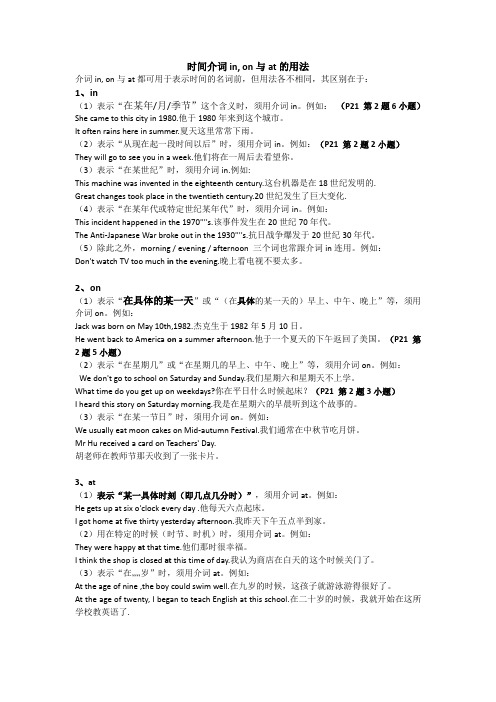
时间介词in, on与at的用法介词in, on与at都可用于表示时间的名词前,但用法各不相同,其区别在于:1、in(1)表示“在某年/月/季节”这个含义时,须用介词in。
例如:(P21 第2题6小题)She came to this city in 1980.他于1980年来到这个城市。
It often rains here in summer.夏天这里常常下雨。
(2)表示“从现在起一段时间以后”时,须用介词in。
例如:(P21 第2题2小题)They will go to see you in a week.他们将在一周后去看望你。
(3)表示“在某世纪”时,须用介词in.例如:This machine was invented in the eighteenth century.这台机器是在18世纪发明的.Great changes took place in the twentieth century.20世纪发生了巨大变化.(4)表示“在某年代或特定世纪某年代”时,须用介词in。
例如:This incident happened in the 1970''''s.该事件发生在20世纪70年代。
The Anti-Japanese War broke out in the 1930''''s.抗日战争爆发于20世纪30年代。
(5)除此之外,morning / evening / afternoon 三个词也常跟介词in连用。
例如:Don't watch TV too much in the evening.晚上看电视不要太多。
2、on(1)表示“在具体的某一天”或“(在具体的某一天的)早上、中午、晚上”等,须用介词on。
例如:Jack was born on May 10th,1982.杰克生于1982年5月10日。
He went back to America on a summer afternoon.他于一个夏天的下午返回了美国。
全面、清晰的in、on、at的时间用法和地点用法
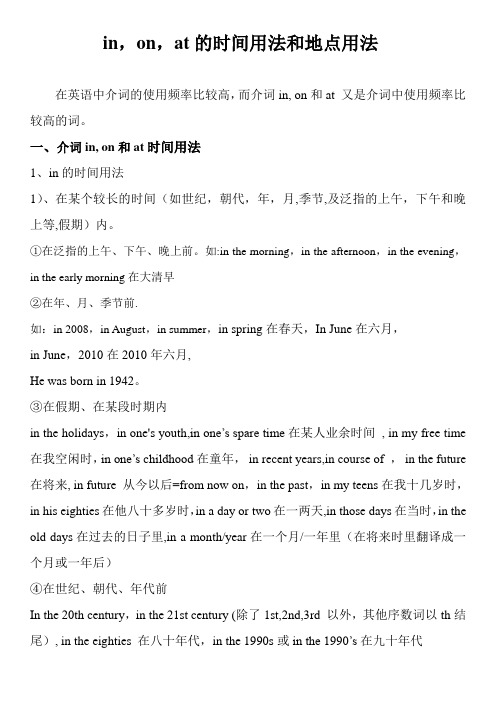
in,on,at的时间用法和地点用法在英语中介词的使用频率比较高,而介词in, on和at 又是介词中使用频率比较高的词。
一、介词in, on和at时间用法1、in的时间用法1)、在某个较长的时间(如世纪,朝代,年,月,季节,及泛指的上午,下午和晚上等,假期)内。
①在泛指的上午、下午、晚上前。
如:in the morning,in the afternoon,in the evening,in the early morning在大清早②在年、月、季节前.如:in 2008,in August,in summer,in spring在春天,In June在六月,in June,2010在2010年六月,He was born in 1942。
③在假期、在某段时期内in the holidays,in one's youth,in one’s spare time在某人业余时间, in my free time 在我空闲时,in one’s childhood在童年,in recent years,in course of ,in the future 在将来, in future 从今以后=from now on,in the past,in my teens在我十几岁时,in his eighties在他八十多岁时,in a day or two在一两天,in those days在当时,in the old days在过去的日子里,in a month/year在一个月/一年里(在将来时里翻译成一个月或一年后)④在世纪、朝代、年代前In the 20th century,in the 21st century (除了1st,2nd,3rd 以外,其他序数词以th结尾), in the eighties 在八十年代,in the 1990s或in the 1990’s在九十年代2)、在一段时间in a month/year在一个月/年里(在将来时里翻译成一个月/年之后)in the day(time)在白天,可换成duringin my childhood在我的童年里in my free/leisure time在我空闲时,in可换成during,也可以写成at leisure在空闲时。
超能英语语法之介词in, on, at在表示时间时的用法区别
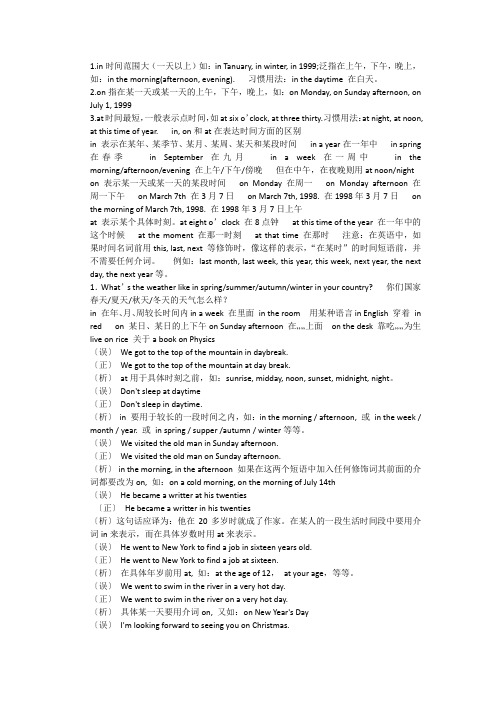
1.in时间范围大(一天以上)如:in Tanuary, in winter, in 1999;泛指在上午,下午,晚上,如:in the morning(afternoon, evening). 习惯用法:in the daytime 在白天。
2.on指在某一天或某一天的上午,下午,晚上,如:on Monday, on Sunday afternoon, on July 1, 19993.at时间最短,一般表示点时间,如at six o’clock, at three thirty.习惯用法:at night, at noon, at this time of year. in, on和at在表达时间方面的区别in 表示在某年、某季节、某月、某周、某天和某段时间in a year在一年中in spring 在春季in September 在九月in a week 在一周中in the morning/afternoon/evening 在上午/下午/傍晚但在中午,在夜晚则用at noon/night on 表示某一天或某一天的某段时间on Monday 在周一on Monday afternoon 在周一下午on March 7th 在3月7日on March 7th, 1998. 在1998年3月7日on the morning of March 7th, 1998. 在1998年3月7日上午at 表示某个具体时刻。
at eight o’clock 在8点钟at this time of the year 在一年中的这个时候at the moment 在那一时刻at that time 在那时注意:在英语中,如果时间名词前用this, last, next 等修饰时,像这样的表示,“在某时”的时间短语前,并不需要任何介词。
例如:last month, last week, this year, this week, next year, the next day, the next year等。
介词in,on,at在表示时间时的区别
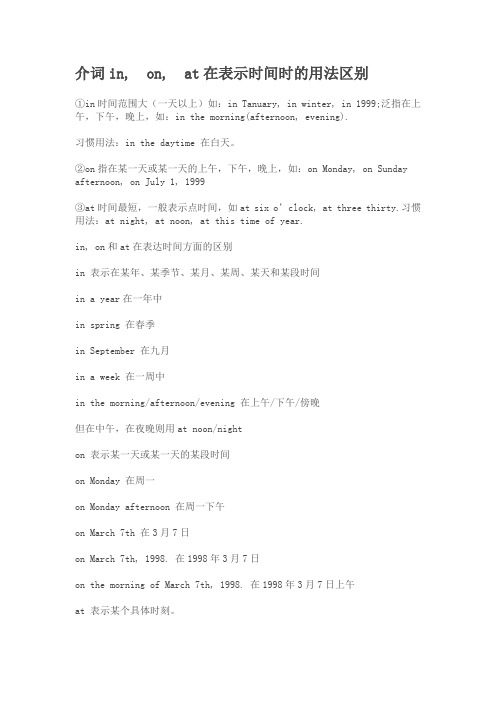
介词in, on, at在表示时间时的用法区别①in时间范围大(一天以上)如:in Tanuary, in winter, in 1999;泛指在上午,下午,晚上,如:in the morning(afternoon, evening).习惯用法:in the daytime 在白天。
②on指在某一天或某一天的上午,下午,晚上,如:on Monday, on Sunday afternoon, on July 1, 1999③at时间最短,一般表示点时间,如at six o’clock, at three thirty.习惯用法:at night, at noon, at this time of year.in, on和at在表达时间方面的区别in 表示在某年、某季节、某月、某周、某天和某段时间in a year在一年中in spring 在春季in September 在九月in a week 在一周中in the morning/afternoon/evening 在上午/下午/傍晚但在中午,在夜晚则用at noon/nighton 表示某一天或某一天的某段时间on Monday 在周一on Monday afternoon 在周一下午on March 7th 在3月7日on March 7th, 1998. 在1998年3月7日on the morning of March 7th, 1998. 在1998年3月7日上午at 表示某个具体时刻。
at eight o’clock 在8点钟at this time of the year 在一年中的这个时候at the moment 在那一时刻at that time 在那时注意:在英语中,如果时间名词前用this, last, next 等修饰时,像这样的表示,“在某时”的时间短语前,并不需要任何介词。
例如:last month, last week, this year, this week, next year, the next day, the next year等。
in on at做时间介词的用法 -回复
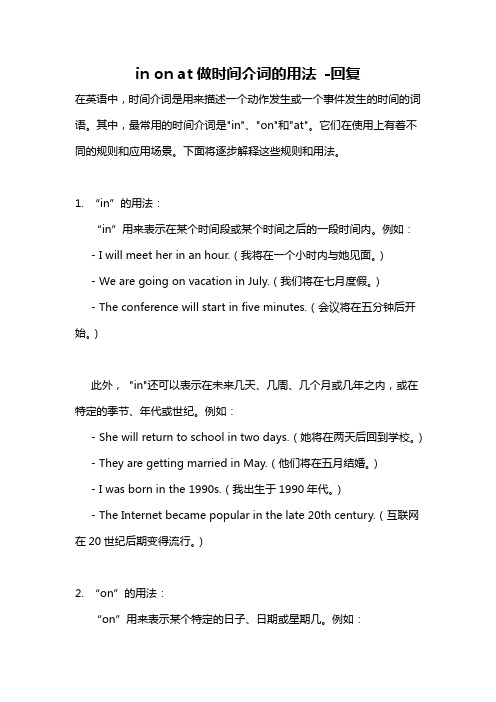
in on at做时间介词的用法-回复在英语中,时间介词是用来描述一个动作发生或一个事件发生的时间的词语。
其中,最常用的时间介词是"in"、"on"和"at"。
它们在使用上有着不同的规则和应用场景。
下面将逐步解释这些规则和用法。
1. “in”的用法:“in”用来表示在某个时间段或某个时间之后的一段时间内。
例如:- I will meet her in an hour.(我将在一个小时内与她见面。
)- We are going on vacation in July.(我们将在七月度假。
)- The conference will start in five minutes.(会议将在五分钟后开始。
)此外,"in"还可以表示在未来几天、几周、几个月或几年之内,或在特定的季节、年代或世纪。
例如:- She will return to school in two days.(她将在两天后回到学校。
)- They are getting married in May.(他们将在五月结婚。
)- I was born in the 1990s.(我出生于1990年代。
)- The Internet became popular in the late 20th century.(互联网在20世纪后期变得流行。
)2. “on”的用法:“on”用来表示某个特定的日子、日期或星期几。
例如:- I have a meeting on Monday.(我星期一有个会议。
)- Our anniversary is on March 15th.(我们的纪念日是在3月15日。
)- The concert will be held on Friday.(音乐会将在星期五举行。
)此外,“on”还可用于特定的假日或节日。
例如:- We celebrate Christmas on December 25th.(我们在12月25日庆祝圣诞节。
介词inonat在表示时间时的用法区别
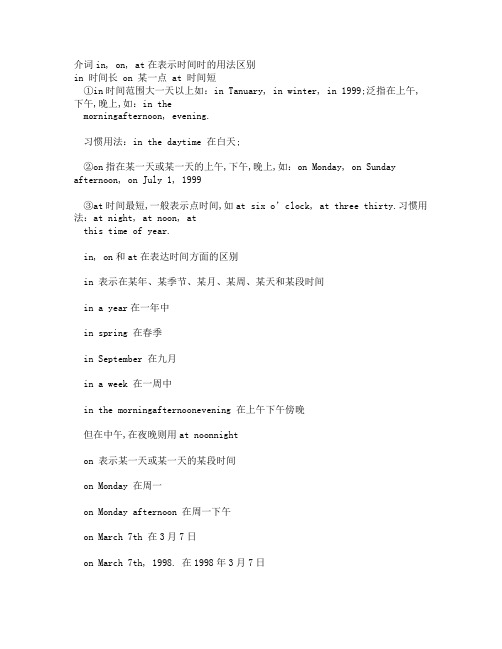
介词in, on, at在表示时间时的用法区别in 时间长 on 某一点 at 时间短①in时间范围大一天以上如:in Tanuary, in winter, in 1999;泛指在上午,下午,晚上,如:in themorningafternoon, evening.习惯用法:in the daytime 在白天;②on指在某一天或某一天的上午,下午,晚上,如:on Monday, on Sunday afternoon, on July 1, 1999③at时间最短,一般表示点时间,如at six o’clock, at three thirty.习惯用法:at night, at noon, atthis time of year.in, on和at在表达时间方面的区别in 表示在某年、某季节、某月、某周、某天和某段时间in a year在一年中in spring 在春季in September 在九月in a week 在一周中in the morningafternoonevening 在上午下午傍晚但在中午,在夜晚则用at noonnighton 表示某一天或某一天的某段时间on Monday 在周一on Monday afternoon 在周一下午on March 7th 在3月7日on March 7th, 1998. 在1998年3月7日on the morning of March 7th, 1998. 在1998年3月7日上午at 表示某个具体时刻;at eight o’clock 在8点钟at this time of the year 在一年中的这个时候at the moment 在那一时刻at that time 在那时注意:在英语中,如果时间名词前用this, last, next 等修饰时,像这样的表示,“在某时”的时间短语前,并不需要任何介词;例如:last month, last week, this year, this week, next year, the next day, thenext year等;1.What’s the weather like in springsummerautumnwinter in yourcountry你们国家春天夏天秋天冬天的天气怎么样in 在年、月、周较长时间内in a week 在里面in the room用某种语言in English 穿着in redon 某日、某日的上下午on Sunday afternoon 在……上面on the desk 靠吃……为生live on rice 关于 a book on Physics〔误〕 We got to the top of the mountain in daybreak.〔正〕 We got to the top of the mountain at day break.〔析〕 at用于具体时刻之前,如:sunrise, midday, noon, sunset, midnight, night;〔误〕 Don't sleep at daytime〔正〕 Don't sleep in daytime.〔析〕 in 要用于较长的一段时间之内,如:in the morning afternoon, 或in the week monthyear. 或 in spring supper autumn winter等等;〔误〕 We visited the old man in Sunday afternoon.〔正〕 We visited the old man on Sunday afternoon.〔析〕 in the morning, in the afternoon 如果在这两个短语中加入任何修饰词其前面的介词都要改为on, 如:on a coldmorning, on the morning of July 14th〔误〕 He became a writter at his twenties〔正〕 He became a writter in his twenties〔析〕这句话应译为:他在20多岁时就成了作家;在某人的一段生活时间段中要用介词in来表示,而在具体岁数时用at来表示;〔误〕 He went to New York to find a job in sixteen years old.〔正〕 He went to New York to find a job at sixteen.〔析〕在具体年岁前用at, 如:at the age of 12, at your age, 等等;〔误〕 We went to swim in the river in a very hot day.〔正〕 We went to swim in the river on a very hot day.〔析〕具体某一天要用介词on, 又如:on New Year's Day〔误〕 I'm looking forward to seeing you on Christmas.〔正〕 I'm looking for ward to seeing you at Christmas.〔析〕在节日的当天用on,而全部节日期间用at,Christmas是圣诞节期间,一般要有两周或更长的时间;〔误〕 I haven't see you during the summer holidays.〔正〕 I haven't seen you since the beginning of the summerholidays.〔析〕 during表示在某一段时间之内,所以一般不与完成时搭配,如:Ivisited a lot of museums during theholiday. 而for表示一段时间,可以用于完成时,如:I haven't see you for a long time. 而through用来表示时间时则为整整,全部的时间;如:It rained through thenight.而since则是表达主句动作的起始时间,一般要与完成时连用;〔误〕 At entering the classroom, I heard the good news.〔正〕 On entering the classroom, I heard the good news.〔析〕 On 加动名词表示一……就;本句的译文应是:我一进入教室就听见这个好消息了;又如:on hearing… 一听见, on arrival一到达就……on表示动作的名词〔误〕 In the beginning of the book, there are some interesting stories.〔正〕 At the beginning of the book, there are some interesting stories.〔析〕 at the begining与at the end都是指某事物的开始与结束部分,均不指时间范围,而in the beginning则是指开始一段时间;in the end=at last是指最终,终于之意;〔误〕 Till the end of next week. I will have finished this work.〔正〕 By the end of next week. I will have finished this work.〔析〕 by 引起的时间状语表示了动作的截止点,其意思为不迟于某一时刻将工作做完,所以主句一般是完成时态;当然可以有将来时态,如:I'll bethere by fiveo'clock.而till则表达其一动作一直持续到某一时刻,但句中的动词一定要用持续性动词,而瞬间的截止性动词应用其否定句式,如:I won'tfinish this work tilluntil next weekend.〔误〕 He came to London before last weekend.〔正〕 He had come to London before last weekend.〔正〕 He came to London two weeks ago.〔析〕 before 一般要与完成时连用,而ago则与一般过去时连用;〔误〕 I have studied English for three years gince I had come here.〔正〕 I have studied English for three years since I came here.〔析〕 since用来表达主句动作的开始时间,所以其引出的从句中应为过去时,而不能用完成时态〔误〕 I can help you repair this bike. You will get it after two hours.〔正〕 I can help you repair this bike. You will get it in two hours.〔析〕中文经常讲两小时之后来取,两天内会修好,而这个介词在英文中要用in 而不要用after;其原因有二,①after 多用于过去时,如:I arrivedin New York. After three days, I found a job in the bank. ② after加时间是表达一个不确定的时间范围,如:after three days, 即三天之后的哪一天都可以;所以在许诺若干时间内会完成某事时,一定要用介词in;〔误〕 Three days after he died.〔正〕 After three days he died.〔正〕 Three days later he died.〔析〕 after 与 later都可以用来表达一段时间之后,但它们所处的位置不同,after 在时间词前,而later在时间词后;〔误〕 She hid herself after the tree.〔正〕 She hid herself behind the tree.〔析〕 after多用来表达某动作之后,所以有的语法书中称它为动态介词,如:I run after him. After finishing myhomework, I went to see a film. 而behind则多用于静态事物之后;〔误〕 There is a beautiful bird on the tree.〔正〕 There is a beautiful bird in the tree.〔析〕树上长出的果实,树叶要用on, 而其他外来的人、物体均要用in the tree.〔误〕 Shanghai is on the east of China.〔正〕 Shanghai is in the east of China.〔析〕在表达地理位置时有3个介词:in, on, to; in表示在某范围之内; on 表示与某地区接壤;to则表示不相接;如:Japan is tothe east of China.〔误〕 I arrived at New York on July 2nd.〔正〕 I arrived in New York on July 2nd.〔析〕 at用来表达较小的地方,而in用来表达较大的地方;at常用于at the school gate, at home, at a bus stop,at the station, at the cinema, at a small village;〔误〕 He lived in No. 3 Beijing Road.〔正〕 He lived at No. 3 Beijing Road.〔析〕在门牌号码前要用at, 并要注意它的惯用法:at the end of the street, at the foot of themountain, at the top of the page;〔误〕 There is a colour TV set at the corner of the hall.〔正〕 There is a colour TV set in the corner of the hall.〔析〕在屋内的角落应用in,而墙的外角用at,如:There is a tree at the corner of the street.〔误〕 This weekend I'll stay in Uncle Wang's.〔正〕 This weekend I'll stay at Uncle Wang's.〔析〕要注意英文的特殊表达法,如:at a tailor's shop 裁缝店=at a tailor's, at the doctor's去看病 at the bookseller's 在书店 at uncle Wang's 在王叔叔家〔误〕 Do you know there is some good news on today's newspaper〔正〕 Do you know there is some good news in today's newspaper〔析〕在报纸上的新闻要用in, 而在具体某一版上,或某一页上则要用on;〔误〕 The school will begin on September 1st.〔正〕 School will begin on September 1st.〔析〕这里的school应看作不可数名词泛指学校的课程,即开学之意;要注意,有些活动场所当表达正在从事该种活动时不要加冠词,如:at table吃饭, When I came to Tom's home, they were at table. 还有: at desk 学习,at work工作 at school 上学, in hospital 住医院 at church 作礼拜如加上定冠词则另有他意,如:at theschool 即在学校工作或办事,in the hospital 即在医院工作或去看望病人;〔误〕 In my way to the station, I bought a newspaper to kill time.〔正〕 On my way to the station, I bought a newspaper to kill time.〔析〕译文为:在去车站的路上我买了份报纸,为的是消磨时光在……的路上应用on one's way…;而 in the way有挡道之意,如:Please move the chair it is in the way;。
at on in 跟时间的用法

at on in 跟时间的用法
在表示时间的用法中,我们使用 at、on、in 来指示不同的时间概念。
下面是它们的用法:
1. "at" 表示具体的时间点或某个特定的时刻。
例如:
- I have a meeting at 9 o'clock.(我有一个会议在九点。
)- She usually goes to bed at midnight.(她通常在午夜睡觉。
)
2. "on" 主要用于日期、星期几和节日等特定的日子。
例如:
- My birthday is on August 10th.(我的生日是在8月10日。
)
- We always have a family gathering on Christmas Day.(我们总是在圣诞节这一天举行家庭聚会。
)
3. "in" 用于表示一个时间段、月份、季节或年份等。
例如:
- I will go on vacation in July.(我将在七月去度假。
)- The flowers bloom in spring.(花朵在春天开放。
)
- He was born in 1990.(他出生于1990年。
)
需要注意的是,具体使用哪个词取决于所表达的时间概念,因此在具体场景中,可能需要根据语境来确定使用哪个词。
on in at的用法及区别口诀
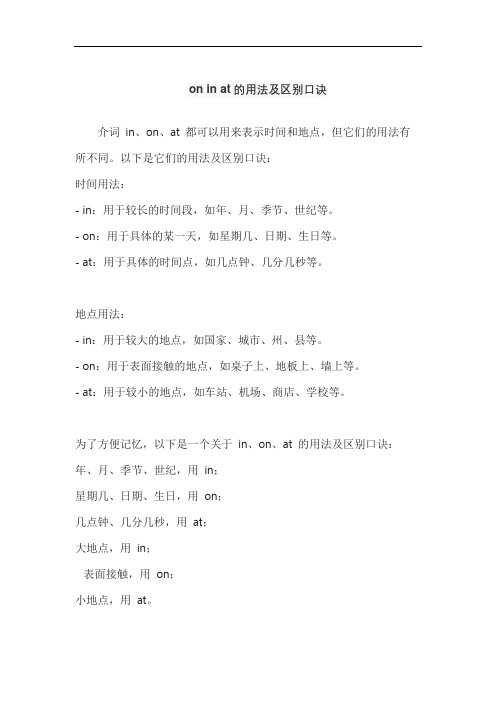
on in at的用法及区别口诀
介词in、on、at 都可以用来表示时间和地点,但它们的用法有所不同。
以下是它们的用法及区别口诀:
时间用法:
- in:用于较长的时间段,如年、月、季节、世纪等。
- on:用于具体的某一天,如星期几、日期、生日等。
- at:用于具体的时间点,如几点钟、几分几秒等。
地点用法:
- in:用于较大的地点,如国家、城市、州、县等。
- on:用于表面接触的地点,如桌子上、地板上、墙上等。
- at:用于较小的地点,如车站、机场、商店、学校等。
为了方便记忆,以下是一个关于in、on、at 的用法及区别口诀:年、月、季节、世纪,用in;
星期几、日期、生日,用on;
几点钟、几分几秒,用at;
大地点,用in;
表面接触,用on;
小地点,用at。
- 1、下载文档前请自行甄别文档内容的完整性,平台不提供额外的编辑、内容补充、找答案等附加服务。
- 2、"仅部分预览"的文档,不可在线预览部分如存在完整性等问题,可反馈申请退款(可完整预览的文档不适用该条件!)。
- 3、如文档侵犯您的权益,请联系客服反馈,我们会尽快为您处理(人工客服工作时间:9:00-18:30)。
介词in, on, at在表示时间时的用法区别①in时间范围大(一天以上)如:in Tanuary, in winter, in 1999;泛指在上午,下午,晚上,如:in the morning(afternoon, evening).习惯用法:in the daytime 在白天。
②on指在某一天或某一天的上午,下午,晚上,如:on Monday, on Sunday afternoon, on July 1, 1999③at时间最短,一般表示点时间,如at six o’clock, at three thirty.习惯用法:at night, at noon, at this time of year.in, on和at在表达时间方面的区别in 表示在某年、某季节、某月、某周、某天和某段时间in a year在一年中in spring 在春季in September 在九月in a week 在一周中in the morning/afternoon/evening 在上午/下午/傍晚但在中午,在夜晚则用at noon/nighton 表示某一天或某一天的某段时间on Monday 在周一on Monday afternoon 在周一下午on March 7th 在3月7日on March 7th, 1998. 在1998年3月7日on the morning of March 7th, 1998. 在1998年3月7日上午at 表示某个具体时刻。
at eight o’clock 在8点钟at this time of the year 在一年中的这个时候at the moment 在那一时刻at that time 在那时注意:在英语中,如果时间名词前用this, last, next 等修饰时,像这样的表示,“在某时”的时间短语前,并不需要任何介词。
例如:last month, last week, this year, this week, next year, the next day, the next year 等。
1.What’s the weather like in spring/summer/autumn/winter in your country?你们国家春天/夏天/秋天/冬天的天气怎么样?in 在年、月、周较长时间内in a week 在里面in the room用某种语言in English 穿着in redon 某日、某日的上下午on Sunday afternoon 在……上面on the desk 靠吃……为生live on rice 关于 a book on Physics〔误〕We got to the top of the mountain in daybreak.〔正〕We got to the top of the mountain at day break.〔析〕at用于具体时刻之前,如:sunrise, midday, noon, sunset, midnight, night。
〔误〕Don't sleep at daytime〔正〕Don't sleep in daytime.〔析〕in 要用于较长的一段时间之内,如:in the morning / afternoon, 或in the week / month / year. 或in spring / supper /autumn / winter等等。
〔误〕We visited the old man in Sunday afternoon.〔正〕We visited the old man on Sunday afternoon.〔析〕in the morning, in the afternoon 如果在这两个短语中加入任何修饰词其前面的介词都要改为on, 如:on a cold morning, on the morning of July 14th〔误〕He became a writter at his twenties〔正〕He became a writter in his twenties〔析〕这句话应译为:他在20多岁时就成了作家。
在某人的一段生活时间段中要用介词in 来表示,而在具体岁数时用at来表示。
〔误〕He went to New York to find a job in sixteen years old.〔正〕He went to New York to find a job at sixteen.〔析〕在具体年岁前用at, 如:at the age of 12,at your age,等等。
〔误〕We went to swim in the river in a very hot day.〔正〕We went to swim in the river on a very hot day.〔析〕具体某一天要用介词on, 又如:on New Year's Day〔误〕I'm looking forward to seeing you on Christmas.〔正〕I'm looking for ward to seeing you at Christmas.〔析〕在节日的当天用on,而全部节日期间用at,Christmas是圣诞节期间,一般要有两周或更长的时间。
〔误〕I haven't see you during the summer holidays.〔正〕I haven't seen you since the beginning of the summer holidays.〔析〕during表示在某一段时间之内,所以一般不与完成时搭配,如:I visited a lot of museums during the holiday. 而for表示一段时间,可以用于完成时,如:I haven't see you for a long time. 而through 用来表示时间时则为"整整,全部的时间"。
如:It rained through the night.而since则是表达主句动作的起始时间,一般要与完成时连用。
〔误〕At entering the classroom, I heard the good news.〔正〕On entering the classroom, I heard the good news.〔析〕On 加动名词表示"一……就"。
本句的译文应是:我一进入教室就听见这个好消息了。
又如:on hearing… 一听见,on arrival 一到达就……(on表示动作的名词)〔误〕In the beginning of the book, there are some interesting stories.〔正〕At the beginning of the book, there are some interesting stories.〔析〕at the begining与at the end都是指某事物的开始与结束部分,均不指时间范围,而in the beginning 则是指开始一段时间。
in the end=at last是指"最终,终于"之意。
〔误〕Till the end of next week. I will have finished this work.〔正〕By the end of next week. I will have finished this work.〔析〕by 引起的时间状语表示了动作的截止点,其意思为"不迟于某一时刻将工作做完",所以主句一般是完成时态。
当然可以有将来时态,如:I'll be there by five o'clock.而till则表达其一动作一直持续到某一时刻,但句中的动词一定要用持续性动词,而瞬间的截止性动词应用其否定句式,如:I won't finish this work till(until) next weekend.〔误〕He came to London before last weekend.〔正〕He had come to London before last weekend.〔正〕He came to London two weeks ago.〔析〕before 一般要与完成时连用,而ago则与一般过去时连用。
〔误〕I have studied English for three years gince I had come here.〔正〕I have studied English for three years since I came here.〔析〕since用来表达主句动作的开始时间,所以其引出的从句中应为过去时,而不能用完成时态〔误〕I can help you repair this bike. You will get it after two hours.〔正〕I can help you repair this bike. You will get it in two hours.〔析〕中文经常讲两小时之后来取,两天内会修好,而这个介词在英文中要用in而不要用after。
其原因有二,①after 多用于过去时,如:I arrived in New York. After three days, I found a job in the bank. ②after 加时间是表达一个不确定的时间范围,如:after three days, 即三天之后的哪一天都可以。
所以在许诺若干时间内会完成某事时,一定要用介词in。
〔误〕Three days after he died.〔正〕After three days he died.〔正〕Three days later he died.〔析〕after 与later都可以用来表达一段时间之后,但它们所处的位置不同,after 在时间词前,而later在时间词后。
〔误〕She hid herself after the tree.〔正〕She hid herself behind the tree.〔析〕after多用来表达某动作之后,所以有的语法书中称它为动态介词,如:I run after him. After finishing my homework, I went to see a film. 而behind则多用于静态事物之后。
